Anyone can cook (with a lot of help from these chef-made condiments)!
Lisa Kogawa / For The Times
- Share via
I have a confession to make: The pandemic has turned me into the real-life version of the Condiment King, the most excellent, most underrated villain from “Batman: The Animated Series.” Instead of hoses that shoot powerful streams of ketchup and mustard, I’ve been wielding bottles of Hotville Chicken Cayenne hot sauce and lashing bland food with spoonfuls of chile crisp from Yang’s Kitchen, Needle, Hui Tou Xiang, Go Go Bird and Rice Box —to name a few.
Truth is, condiments are the unsung heroes of the pandemic. These dabs of chile sauce, bottles of marinade and sprinkles of special seasoning helped me survive my own cooking and countless takeout meals for much of 2020 and all of 2021. They can elevate, enhance and transform the most mundane of dishes and just about any home cook.
The global market for condiments, which includes dressings, sauces and spices, had an estimated value of $76.6 billion in 2020. That number is expected to jump to $103.7 billion by 2026, according to a new study published by Global Industry Analysts Inc., a market research company. That’s a lot of hot sauce and ketchup.
In Los Angeles, condiments played a dual role: The purchase of products made by local restaurants helped support your favorite struggling businesses while dining rooms were closed. Many started whipping up batches of their signature sauces and marinades as an additional form of income and as a way to reach customers well beyond their own ZIP Codes.
The following are five new, highly covetable condiments designed to give you a taste of your favorite restaurants at home.
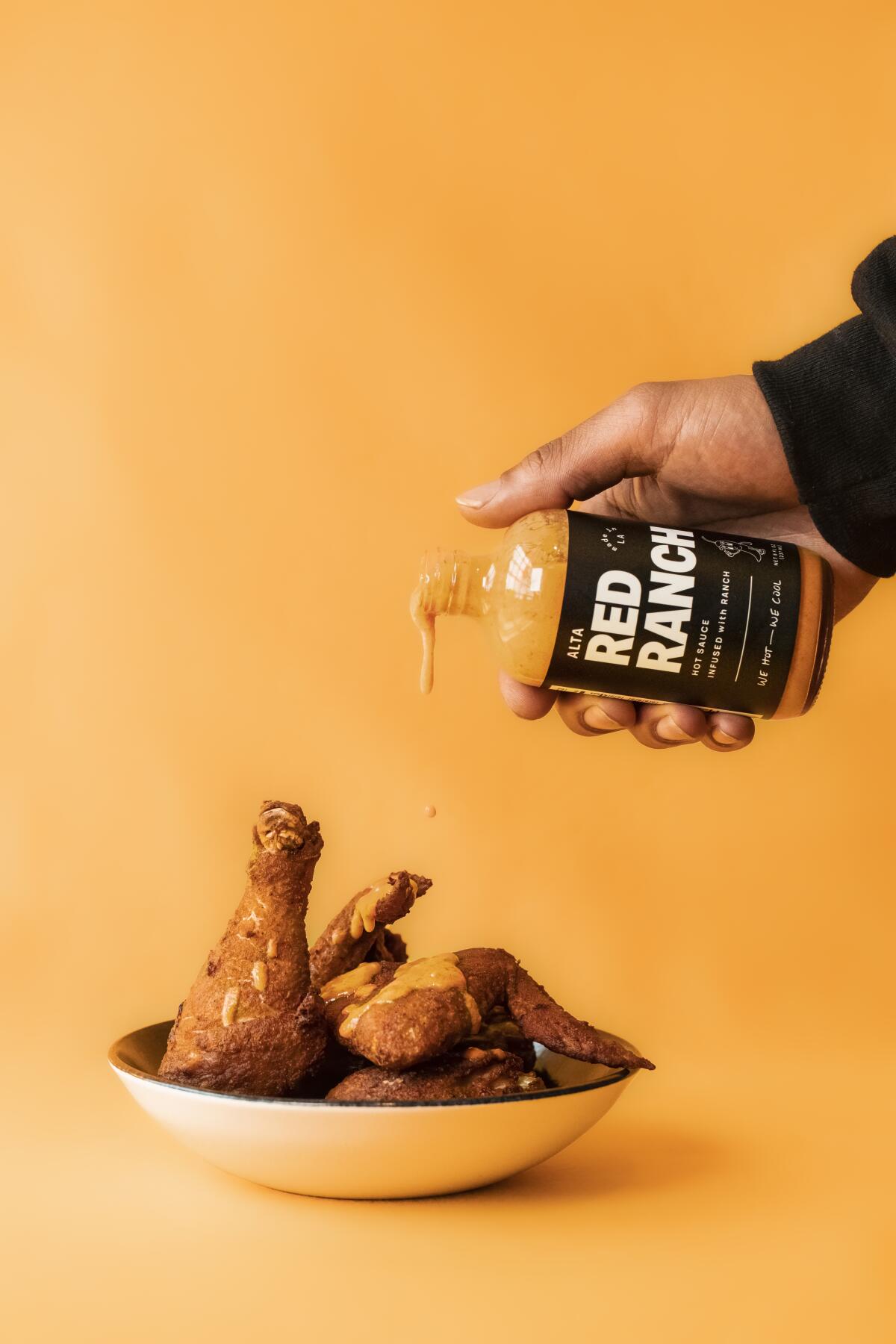
Alta Adams Red Ranch, 8 ounces, $16
“I made a penne a la vodka using it.”
“It was even good as a salad dressing on a wedge.”
On a recent afternoon, chefs Keith Corbin and Daniel Patterson sat at a table inside their West Adams restaurant, Alta Adams, and contemplated the many uses for their new Red Ranch sauce.
“Mix it with yogurt for crudités,” Patterson said. “It’s great in cooking. For meatloaf. Fifty-fifty with ketchup, it’s a great dipping sauce for fries or chips …”
“Or on collard greens,” Corbin added.
“I douse it on my beans and rice,” Patterson said.
Patterson and Corbin are about to launch the first in a line of pantry products from Alta restaurant. Red Ranch is a combination of the restaurant’s signature Fresno chile hot sauce and the chefs’ take on a classic ranch, made with yogurt and buttermilk. It has a strong, vibrant kick of chile that mellows with the cool dairy and the many fresh herbs.
The idea for the sauce came from a conversation with Ted Chung, one of Snoop Dogg’s business partners. Chung mentioned a taste memory that involved mixing packets of ranch and hot sauce for his orders of fast-food chicken. The three considered the mix to be an “L.A. flavor combination that is universal for people,” and the idea for Red Ranch was born. The sauce is available at the restaurant and at Now Serving in Chinatown. It will soon be for sale online, featured alongside recipes that incorporate the sauce.
“People love cooking, and they want to feel like they are elevating food at home,” Corbin said. “Giving them restaurant-quality product and giving them a taste of Alta feels really good.”
Red Ranch is just the beginning. Corbin and Patterson plan to sell the restaurant’s smoky oil (the secret to that unctuousness in the meat-free collard greens), apple barbecue sauce, barbecue rub and chicken fry (the flour and spices used to coat the restaurant’s fried chicken) in the next four months.
5359 W. Adams Blvd., Los Angeles, (323) 571-4999, altaadams.com
Jitlada red and green hot sauces, 5 ounces, $10 each
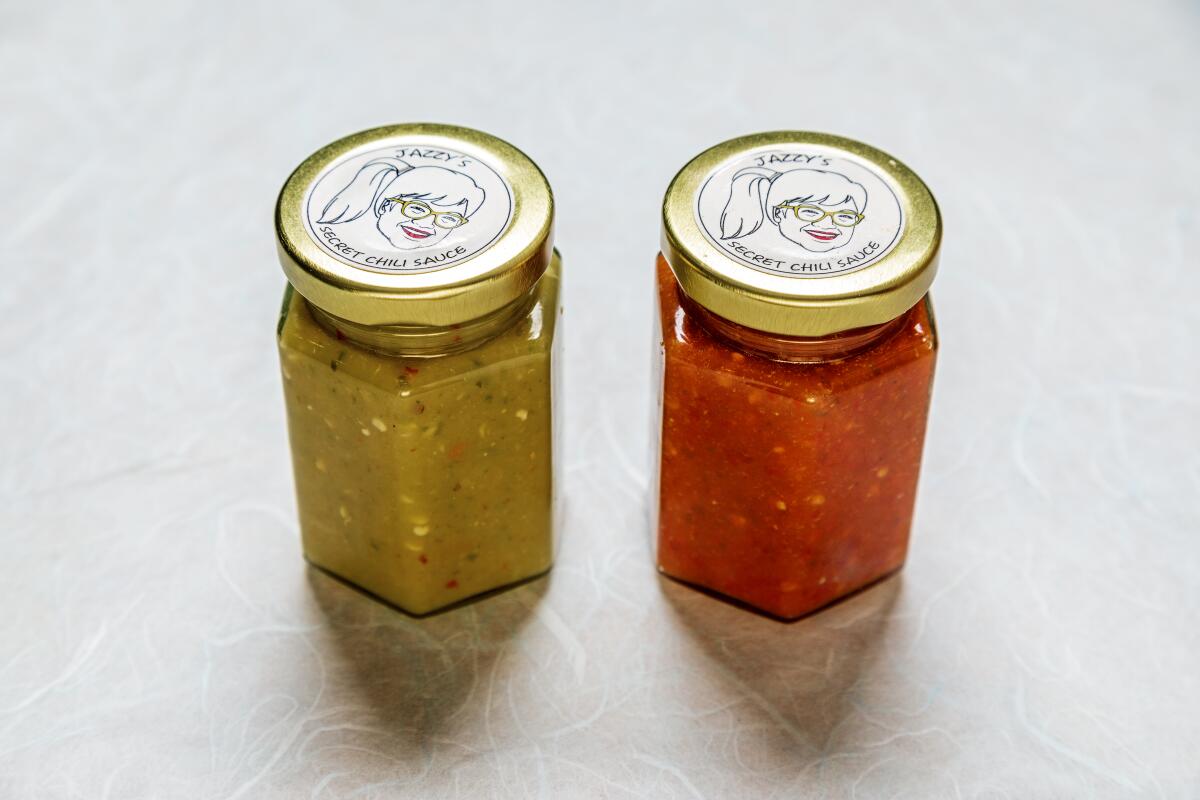
Jazz Singsanong had been bringing her red and green hot sauces to food events for years before she ever thought about bottling and selling them. Now Singsanong, who co-owns the Jitlada Southern Thai restaurant in Thai Town with her niece Sugar Sungkamee, ships her sauces all over the country.
“Most of the shipping is for Texas, New York and New Jersey,” Sungkamee said.
What started as a limited offering in summer 2020 has turned into a blossoming retail business. After selling a few hundred bottles at the restaurant, Singsanong and Sungkamee decided to start offering the sauces online as well.
The red sauce is packed with red Thai chiles, garlic and lime juice. At the restaurant, it’s served alongside duck rolls, beef salad, fried rice and fried fish. If diners ask for any sort of hot sauce or specifically for Sriracha, this is what Singsanong and Sungkamee will offer.
The green sauce is made with green Thai chiles, lime, light soy sauce and sugar. It comes with the Jitlada mussels, squid salad and grilled squid. But Singsanong says it’s great on any kind of seafood, all the time.
With the success of the hot sauces, Singsanong and Sungkamee plan to start selling more of the pastes and sauces used as the foundation for many of Jitlada’s most popular dishes, including the garlic pepper sauce used to cook the garlic red snapper, garlic green beans, garlic lamb and grilled prawns. This sauce, Singsanong says, can be used on anything from ground pork to chicken and fried rice. They also plan to sell curry paste and the pad Thai sauce used to make the restaurant’s signature noodle dish.
“It’s our way of giving people that are far away a taste of Jitlada or for fans to try to make their own versions at home,” Sungkamee said.
5233 ½ W. Sunset Blvd., Los Angeles, (323) 667-9809, jitladala.com
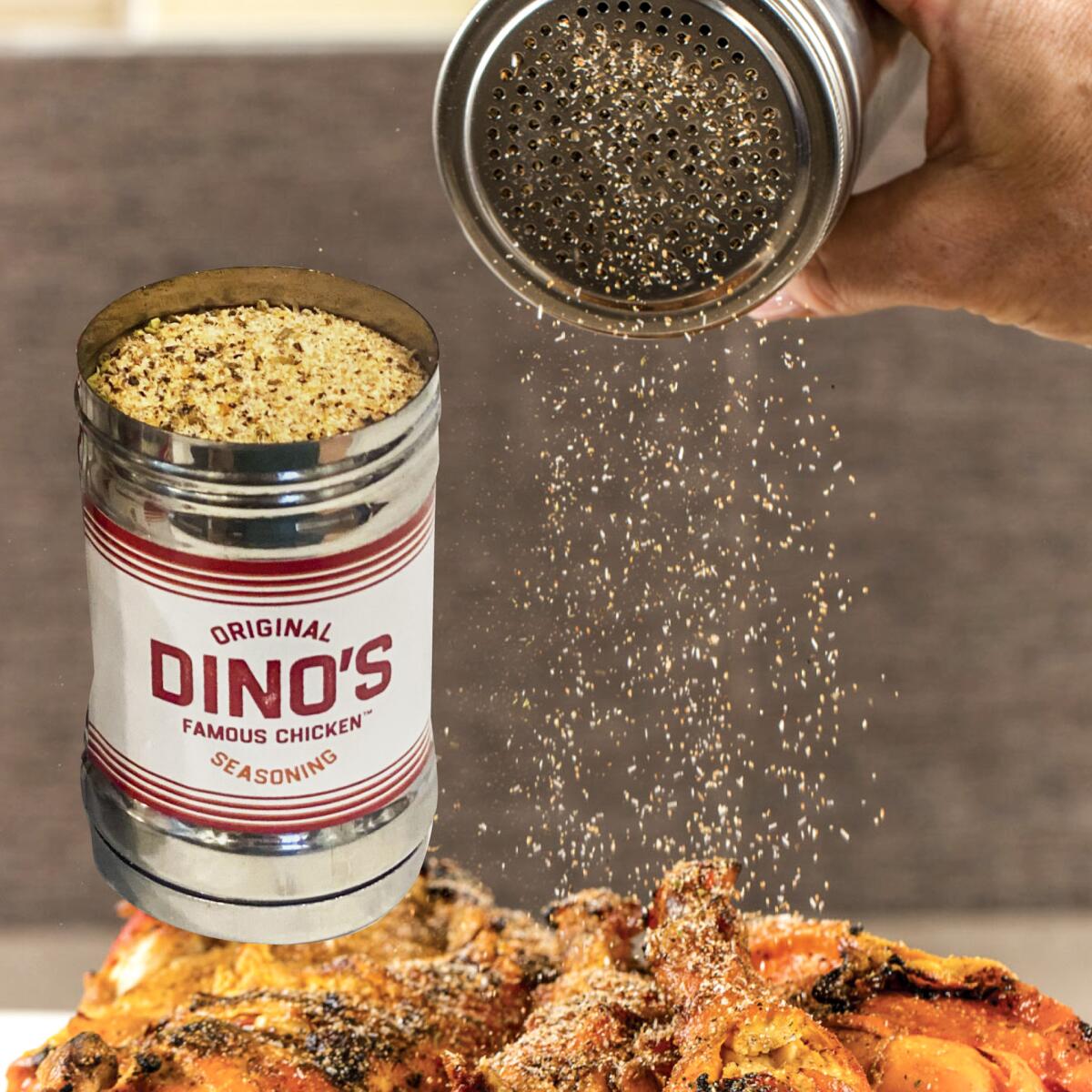
Dino’s Famous Chicken Thiccc sauce, 9 ounces, $8.50, and Dino’s chicken seasoning shakers, 2 ounces, $4.75, and 4 ounces, $8.75
Dino’s Famous Chicken founder Demetrios Pantazis created a special blend of seasoning to use on his chicken and other meats at family barbecues in the 1960s. Today, it’s used as the base for the most popular menu items at the family’s four restaurants to marinate chicken and as a seasoning to sprinkle on top of finished chicken, burgers and fries.
“This is our staple of Dino’s,” Maria Pantazis-Defterios said. She runs the company with her mother, Eleni, and sisters Tina Pantazis Andrews, Nicole Pantazis-Pitsos and Katerina Pantazis-Nichols.
After more than 50 years in business and countless requests, the sisters decided to start selling their late father’s seasoning blend in early March. Think of Lawry’s Seasoned Salt but on steroids — not as salty, with an herbaceous kick of what tastes like oregano and rosemary. “We were very protective of the recipe, especially my dad, so we were slow to bring it to the market,” Pantazis-Defterios said.
Also available is the Dino’s Thiccc sauce, an addictive dressing fortified with the Dino’s seasoning blend used to coat the restaurant’s chicken tenders and wings. The sisters also plan to start selling what they call the “juice,” or the marinade and finishing sauce used for grilled chicken, in April. The sisters worked with chef Royce Burke to develop and scale the recipes for retail.
Andrews said the Thiccc sauce is designed to be used on shrimp, any fish and pasta in addition to the chicken and other proteins. In college, she said, she made many friends by using it on her steaks.
The Dino’s line of pantry products will be available at the Los Angeles, Azusa and Pico Rivera restaurants, on the Dino’s website and via Instagram.
2575 W. Pico Blvd., Los Angeles, (213) 380-3554, dinosfamouschicken.com
Kogi marinades, dipping sauces and spreads (starting at $4.79) and Hi Note cheezio pepe seasoning (3-pack for $14.99)
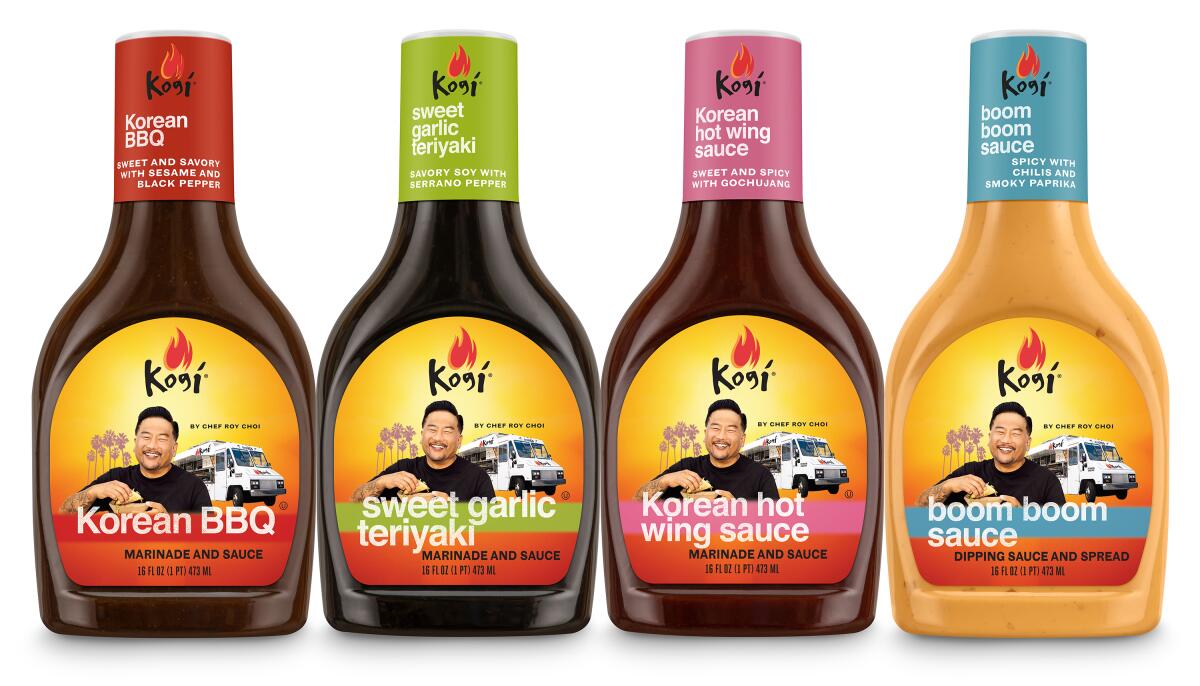
When the Kogi BBQ truck first started to roll through the streets of Los Angeles in 2008, people were enamored with Roy Choi’s short rib tacos. Fans fiercely updated their Twitter feeds, tracked the truck’s whereabouts, dashed to its location, then waited in line for hours for Choi’s Korean Mexican tacos, quesadillas and burritos.
“People would always say, ‘How can I get your sauce?’” Choi said on a recent phone call. “For 10 years, I told them I’m just trying to prep the food and keep up. We ended up putting sauces in deli cups and selling them for $2.”
Choi finally got around to selling his Kogi BBQ marinade and sauce as a wholesale item in 2018, supplying everyone from hotel chefs to amusement park cooks. He started selling the sauce at Smart and Final in 2021 and gradually expanded the line to include a sweet garlic teriyaki, sweet orange chili sauce and sticky spicy wing sauce.
“We tried to make a retail version of every sauce we use for Kogi,” he said. “We started with the marinade and then went on to the salsa roja, our wing sauce, and our secret weapon, a garlic roasted chile soy. They are straight-up representations of the actual sauces from the truck. Now they are so good we use the bottled sauces on the trucks.”
In January 2022, Choi started selling the Kogi BBQ marinade and sauce at Costco locations in the Los Angeles area and Hawaii followed by Southern California locations of Albertsons, Vons and Pavilions in March. Beginning this spring, the Korean BBQ, sweet garlic teriyaki, Korean hot wing sauce and Boom Boom sauce (spicy with chiles and smoked paprika) will roll out at more stores in Southern California, Phoenix and Las Vegas.
“We never figured out how to expand the Kogi BBQ outlets, but the next best thing was the sauces,” he said.
Outside of the Kogi BBQ name, Choi recently started a seasoning company called Hi Note with a group of friends and a nutritionist. The company’s first launch in December 2021 is a seasoning packet called Cheezio Pepe. It’s a plant-based seasoning packet version of the popular pasta dish cacio e pepe.
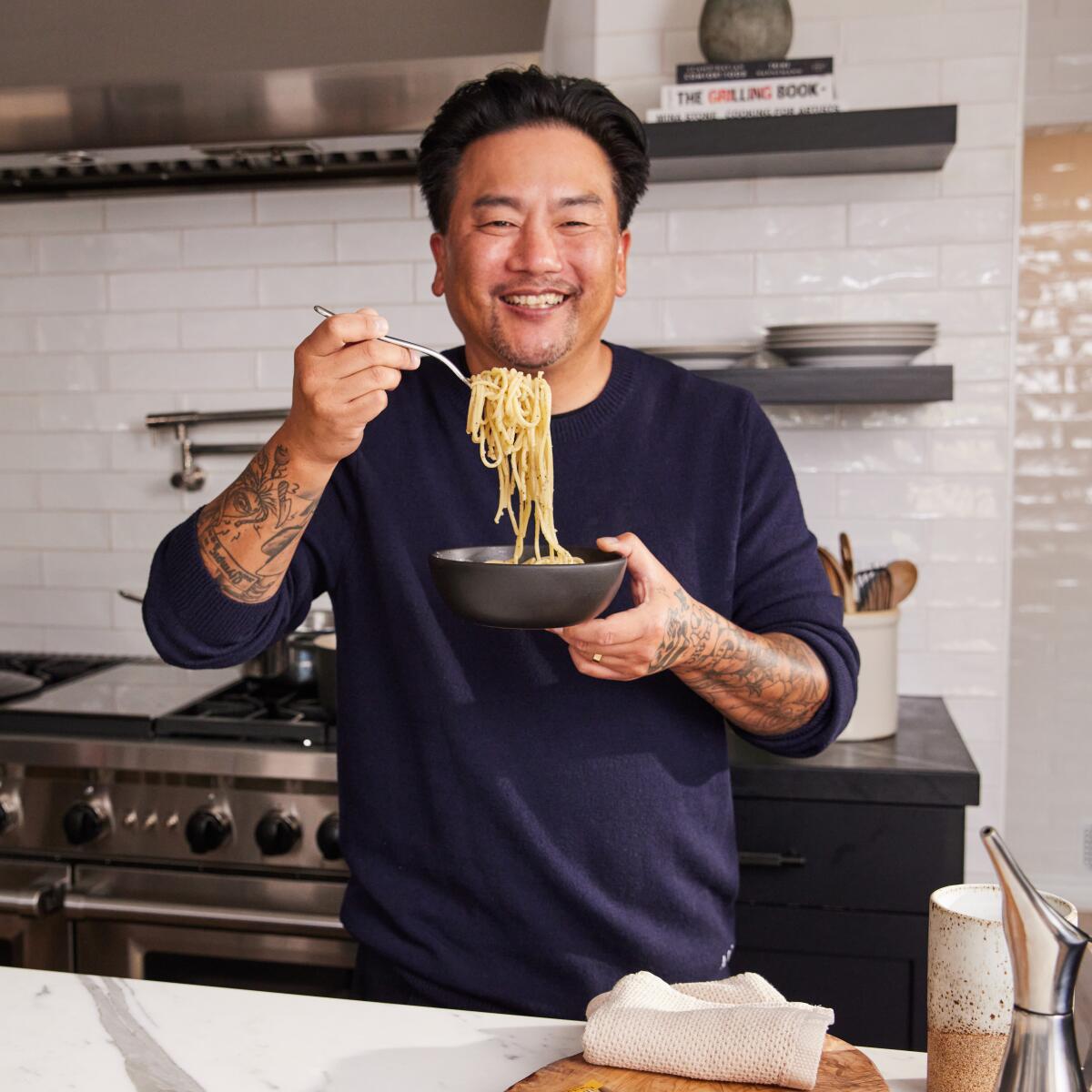
“The idea was, ‘How can we take the old seasoning packet, whether it’s a taco mix or gravy mix or mashed potato mix, and all those things you see in the grocery aisle, and make them clean?” he said. “I grew up on Koolaid packets and all these magical dust things, but now we live in a world where people are more conscious of what we put in our bodies.”
The seasoning is made with nutritional yeast, onion, sea salt, poppy seeds, sesame seeds, black pepper and garlic. You rip open the package, pour it into a pot of cooked pasta, stir and serve.
Next for the Hi Note line of seasonings is the launch of Sloppy Papi, a take on sloppy Joe seasoning for meat, plant-based meats and vegetables. Hi Note products are available only from the company website.
kogilove.store and hellohinote.com
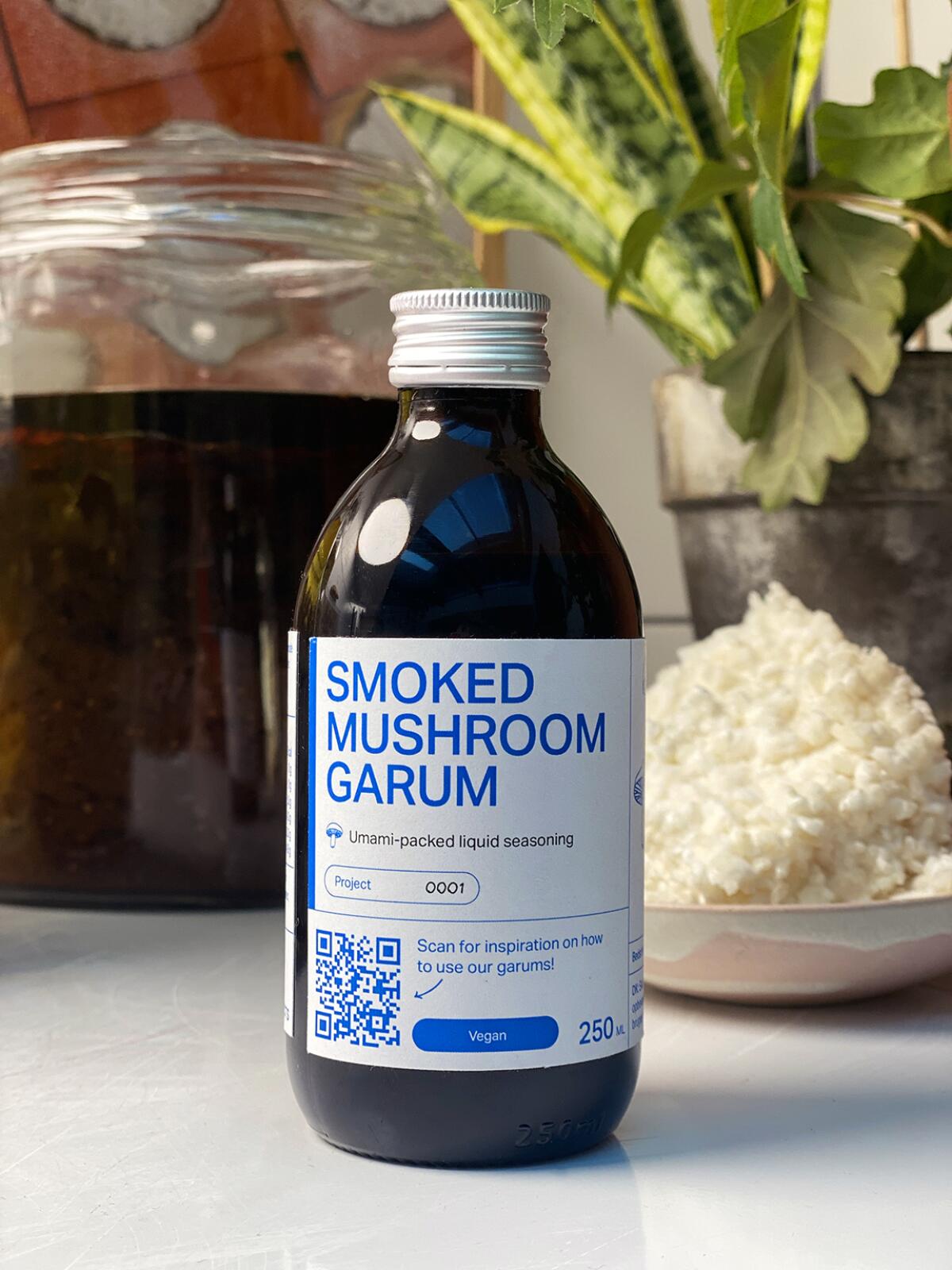
Noma smoked mushroom garum, 8.45 ounces, $24
Noma, the three-Michelin-star Copenhagen restaurant often referred to as the best, most influential in the world, is now selling a liquid seasoning that is the result of thousands of experiments from over a decade in the Noma fermentation lab. This lab is where chef René Redzepi’s team develops a massive collection of fermentations that may or may not make it onto the highly seasonal menus at the restaurant.
“If we’re lucky, something will end up on a dish for a menu or two, and a few thousand people will get to try it,” Annika de Las Heras, chief operating officer of Noma Projects, said on a recent call. “We thought, ‘Wouldn’t it be wonderful someday if we could find a way to share these things with more people?’ Noma is turning 20 next year, and over COVID, it gave us time to think about things, and it just felt like the right time to share something of ourselves with a wider audience.”
Last summer, the fermentation lab team, test kitchen team and Redzepi presented about 100 products to De Las Heras and other Noma veteran team members to try as potential first releases for Noma Projects, the leg of the Noma operation that will now sell retail products. The garum was the favorite.
“Our garum is an adaptation on an ancient recipe,” De Las Heras said. “Traditionally, [garums] are made with fish sauce, and you would use the intestine of the fish, and the enzymes naturally present would break down the proteins and flesh over time, and you’d end up with a super potent fish sauce. We started experimenting using koji instead of fish guts, and that enabled us to experiment with a much wider variety of high-protein but plant-based products.”
De Las Heras said the team ended up with thousands of garums, but some were “horrible and never worked out.” On that list of failed experiments is reindeer garum (“it was just too strong in flavor”) and potato garum (“too starchy”).
The smoked mushroom garum starts with mushroom, koji, water and a small percentage of salt. It’s fermented for five to six weeks, then strained, cold-smoked with birch, pasteurized and bottled. The entire process takes eight to 10 weeks. Last season, it was used as a glaze on grilled maitake mushrooms. This season, the restaurant is making a seaweed broth infused with the garum and reducing it to glaze and season squid.
Home cook and cookbook author Nadine Levy Redzepi (who happens to be René’s wife) worked with Noma chef Kevin Jeung to develop a series of recipes that use the garum for the Noma Projects website, including a 30-minute halloumi steak and vegan ramen.
Only 8,000 bottles of the seasoning were made for the first batch, and they sold out quickly. But De Las Heras said a new batch should be available for sale online in May.
“Our goal is to help people cook with more flavor,” she said. “Seeing people using it and tagging us on Instagram, it just feels really heartwarming to share a part of Noma for people who have never had the chance to come and to see our products out in the world.”
The liquid seasoning is just the beginning. De Las Heras said to expect another product launch by the end of the year.
Refshalevej 96, 1432 København K, Denmark, +45 32 96 32 97, nomaprojects.com
More to Read
Eat your way across L.A.
Get our weekly Tasting Notes newsletter for reviews, news and more.
You may occasionally receive promotional content from the Los Angeles Times.








